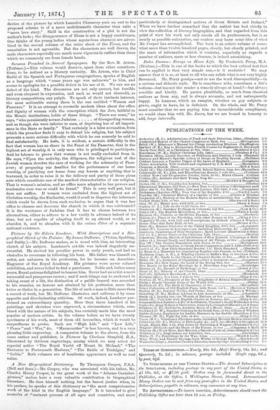Sermons Preached in _Several Synagogues. By the Rev. B. Artom.
(Triibner.)—This volume would deserve, apart from other considera- tions, to be noticed as a literary curiosity. Mr. Alton; who is Chief Rabbi of the Spanish and Portuguese congregations, speaks of English as a language which "some years ago was unknown" to him, and seems to apologise for a possible defect in his use of it. We can see no defect of the kind. The discourses are not only correct, but forcible and even eloquent in expression, and such as would not discredit, as literary compositions, any pulpit. To speak of their intrinsic interest, the most noticeable among them is the one entitled "Woman and Passover." It is an attempt to reconcile modern ideas about the office and dignity of woman with the conception which the Jew, faithful to
the Mosaic institutions, holds of these things "There are some," he says, "who persistently accuse Judaism of disregarding woman,
and as though she were inferior to man, of depriving her of all import- ance in the State or family." That certainly is a false accusation, from which the preacher finds it easy to defend his religion, but his subject presents a more serious difficulty with which he can scarcely be said to deal satisfactorily. He feels, it is evident, a certain difficulty in the fact that woman has no share in the Feast of the Passover, that in the highest act of worship it is only man who is privileged to participate. And he labours to prove that woman is not really excluded from it. He says, "Upon the activity, the diligence, the religious zeal of the Jewish women devolve the care of working for the solemnity of Pass- over; of preparing our families for the performance of our home worship, of purifying our home from any leaven or anything that is leavened, in order to raise it to the delicacy and purity of those pious acts which constitute one of the marked characteristics of our religion. That is woman's mission, and no office more adapted to her powers and tendencies ever was or could be found." This is very well put, but it does not suffice. If women were excluded from the highest act of Christian worship, the Eucharist, would it avail to disprove the inference which would be drawn from such exclusion to argue that it was her office to cleanse and decorate the church in which it was celebrated ? It is the weakness of Judaism that it has to choose between two alternatives, either to adhere to a law vastly in advance indeed of its time, but not capable of adapting itself to an altered world, or to abandon it, and to abandon with it the raison d'être of a separate national existence.


































 Previous page
Previous page